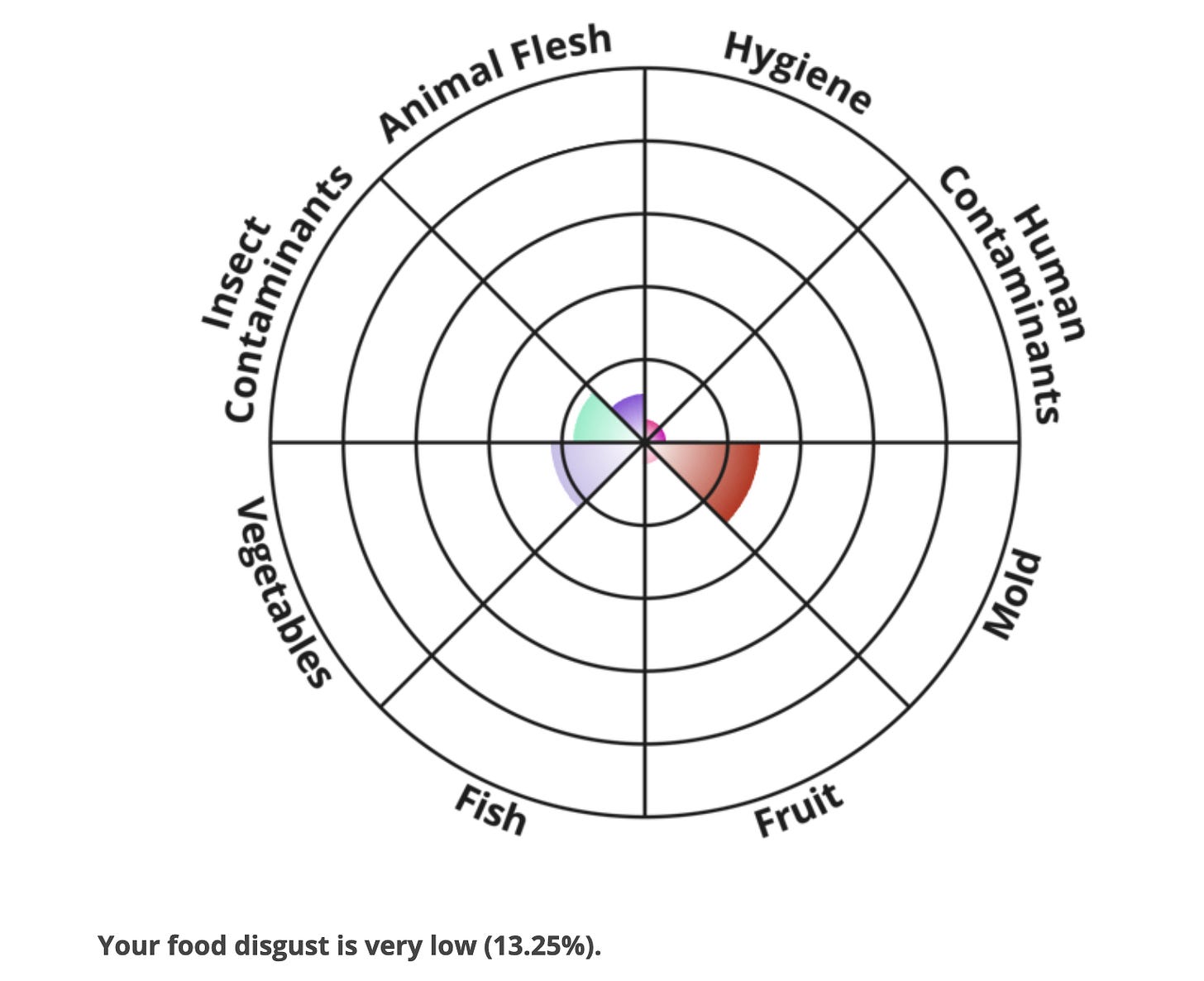Personal Science Week - 230817 Eccentricities
Find more of what makes you you, elderly medicine, and alternative science
Most scientific studies report their conclusions as averages. But you’re not an average — you’re you. Personal Science is about finding science that works for you.
This week we look at a site specializing in custom tests, an example of elderly medicine, and some more ways to broaden peer review.
Individual Differences Research
Researchers at the Technical University of Zurich host a web site with dozens of pointers to free research papers and online tests that can help you find “individual differences” on a broad set of areas, from psychology to philosophy. One unusual test they offer is one that claims food disgust can be divided into eight categories. Use their free online test to find your specific score.
Apparently I’m not much of a picky eater, so my food disgust is pretty low.

If hygiene isn’t of particular interest, then check out the dozens of other tests including the more topical Classic Barbies Test to find which Barbie type you are.
GERD Treatment and Elderly Medicine
When an elderly acquaintance suddenly lost kidney function, his doctors dismissed it as a sad, but inevitable consequence of aging. Upon closer questioning, I learned that he had recently doubled the dose of a medication he’d been taking for years in order to combat an annoying heartburn he felt after eating. Gastroesophageal reflux disease, or GERD is a common condition, usually treated safely and successfully with cheap over-the-counter Prilosec or its generic equivalents. But who says it’s safe, and how do they know?
The Personal Science approach to medication always starts with both curiosity and skepticism. A doctor or other credentialed Expert™ recommendation is no substitute for the difficult work of asking questions about why you might want to put something into your body. It took very little searching for me to discover that Prilosec and its related medications — while proven safe for decades in average users — have never been formally tested on older people.
It’s not surprising that professional scientists avoid testing drugs in the elderly. Clinical trial results are easier and cleaner if you can test in a group of people who suffer from only one condition at a time — and unfortunately it’s difficult to find elderly people who have a single condition like GERD.
In my friend’s case, a brief internet search revealed multiple case reports of people like him, elderly patients suffering kidney problems after taking a medication that is perfectly safe in the vast majority of younger people.
If you have elderly parents or relatives receiving medication that is well-studied and safe, this is a reminder to double-check whether the same rigor went into testing it in older adults — and if their doctor knows to specifically consider the differences.
Meanwhile, a new paper suggests simple exercises to eliminate GERD: chew your food, then kneel down with you head below your stomach and swallow. Supposedly this will develop the muscles that keep your stomach closed while eating.
(We discussed other non-standard treatments to try in PS Week 230504)
Unconventional Science
Personal Scientists are free to indulge ideas that are too risky for professionals dependent on funding grants or an employer’s largess. Since many of the best ideas are right on the edge between genius and insanity, this gives us a potential creative edge to explore genuinely new science.
One repository of this is the viXra server (the name is “arXiv” spelled backwards). Run as a non-profit 501(c)(3) organization founded by some PhDs who wanted to make a more accessible outlet for speculative science, it hosts more than 40,000 papers on a variety subjects. Check out this series on Martian geometry, where somebody has meticulously studied various Mars photos to conclude that various features must have been built by some intelligence. If that’s not your thing, there are plenty of other speculative ideas — and you’re free to submit your own. There’s no peer review, but a related talk site will let you get feedback from thousands of other users.
Speaking of peer review, the new site Review Commons wants to be the “The preprint peer-review platform”. Rather than today’s system, where a scientist submits a new finding to a specific journal, waiting months or even years for it to be accepted and published, they hope to let you submit once, get it reviewed, and then the site will help choose the final publication.
Good Science Project by Stuart Buck on Substack is another excellent place to find discussions about how to improve science, including a recent post about why peer review should be more like meteorology.
Finally, Replace Peer Review with Peer Replication is an argument for why science should formalize replication, and discontinue the current fault-ridden process of peer review.
About Personal Science
Personal Scientists use science for personal reasons, not as part of a job. We treat science as a verb -- something you do -- not as a noun, and we certainly don't use it as a synonym for "truth" or "cool facts about nature".
As always contact us directly, or leave a comment if you have other topics you’d like us to cover.


Thanks for referral to vixra! Alot of fun to poke around...Will surely spend hours there!